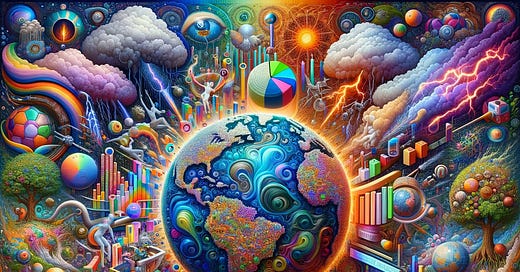Our Great Opportunity
Destruction clarifies our path to human redemption and planetary regeneration
Eight years ago, I published How Soon Is Now. The book was an absolute nightmare to write, taking me ten years from conception to completion. Trying to synthesize so many divergent ideas (while taking too many psychedelics) nearly drove me crazy. In that book, I put together a plan for how we can transform human society as an authentic response to the ecological mega-crisis which threatens most forms of life on Earth and, as Noam Chomsky and others have noted, could utterly destroy organized human societies.
I admit, at the moment, the radical plan I put together in my book looks a bit far away from being implemented. However, the current wrecking ball demolishing our laws, norms, and institutions could, ultimately, allow for something entirely different to emerge. Certainly, under Neoliberalism—the obsolete Democratic establishment—we were never going to undertake the level of profound transformation that is necessary. The collapse of the ideology of progressive, liberal, humanism—along with all of its obvious hypocrisies and compromises—could be the necessary precondition for a truly authentic movement to emerge. The rapid implementation of Artificial Intelligence has the potential to create a new revolutionary class of disenfranchised knowledge workers. Optimistically, we could be clearing the decks right now in the only way possible, so we can build, or weave, an authentic technical and social infrastructure around ourselves and our planet, eventually.
In How Soon Is Now, I proposed that humanity needs to undergo a rapid transition to a “regenerative society” to avert catastrophic ecological and social collapse, which we already know is underway. While Trump and his allies refuse to acknowledge global warming, the U.S. experiences an almost unbelievable onslaught of ecological disasters, including the recent devastation of Los Angeles ($250 billion in damage) and North Carolina ($60+ billion in damage). The transformation I envision requires profound changes in our technical infrastructure, social/political systems, and our collective consciousness. In the book, I addressed each of these three areas in turn, as I outline below.
While I acknowledge the problems with mass media mind-control, religious indoctrination, techno-fascism, and so on, it is still conceivable that awareness of the ecological crisis could incite a “mutational leap” into a new consciousness and state of collective empathy, based on a new way of understanding ourselves and our relationship to the Earth. Such a transformation could, also, address the crisis of meaning which has led to our current cul de sac.
The transition to a regenerative society is a long-term undertaking that requires discipline, devotion, reverence, radical love, and universal compassion. The scale of the planetary crisis is so vast that individual or local actions can seem meaningless unless they are meshed into a unified global movement. Today, we find ourselves in an “Emperor’s new clothes” situation; Despite the ferocious hype, most people now recognize, on some level, our current trajectory is unworkable and unsustainable. They know it in their bones, despite whatever level of conditioning they have received.
The foundational myths of post-industrial civilization—endless growth, consumerism, and the illusion of separation from nature—must be replaced with a more holistic and integrated understanding. One of the core ideas of How Soon Is Now is that the ecological crisis is not merely a technical or political problem; it is a spiritual and existential meltdown.
Keep reading with a 7-day free trial
Subscribe to Liminal News With Daniel Pinchbeck to keep reading this post and get 7 days of free access to the full post archives.





